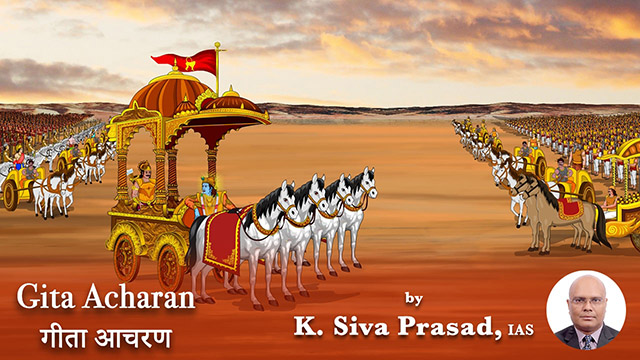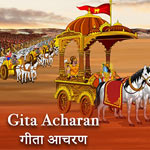
Trembling, saluting with joined palms, bowing, overwhelmed with fear (11.35), Arjun says, "The world is delighted and rejoices in your praise; 𝙧𝙖𝙠𝙨𝙝𝙖𝙨𝙖𝙨 (demons) flee in terror and 𝙨𝙞𝙙𝙙𝙝𝙖𝙨 (perfected ones) bow (11.36) as you are the primal cause even to Brahma, Lord of Gods, Abode of the universe. You are the imperishable, the being and non-being, that which is supreme (11.37). You are the knower, the object of knowledge, and the supreme Goal. By you is the universe pervaded, Being of infinite forms" (11.38).
Arjun further says that HE is 𝙑𝙖𝙮𝙪 (wind), 𝙔𝙖𝙢𝙖 (God of death), 𝘼𝙜𝙣𝙞 (fire), and 𝙑𝙖𝙧𝙪𝙣𝙖 (sea god) (11.39); and offers salutations (11.40). He continues, "You are the father of this world, of the moving and unmoving, greater than the greatest, none equal to you" (11.43).
Arjun bows, prostrates and seeks HIS grace as a son to father; a lover from a lover; a friend from a friend (11.44). Arjun is both delighted to see what was not seen before and at the same time, his mind is filled with fear and seeks mercy (11.45). He prays to see Krishna in his earlier form (11.46).
While Arjun mentions three relationships of father-son; friend to a friend and lover to a lover, grace is needed for any healthy relationship and all cultures advocate the same. Grace is an essential element to have long lasting relationships and contemporary literature guides us in this direction especially in the context of marriage and family. Grace is the ability to forgive others in relationships realising that we are capable of committing the same mistakes as others and have compassion towards others. This comes when equanimity is inculcated at deeper levels; when we transcend dualities of praise and criticism; when we see ourselves in others and others in ourselves which helps us embrace differences.

